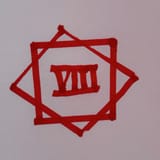Search Results
5/31/2025, 10:36:27 PM
>>6250089
The birds may sleep, and beasts may sleep. The ocean, too, may seem to fall into a deep slumber, when the night is at its highest, when the stars shine their brightest.
But the floating city that rules those oceans — that one never sleeps.
The thin boat slithers between the channels where waves slosh, gathering a few gazes from behind the blinders; it is one of the silent barges, moved by paddle and not by one of those iron monstrosities that Frigéian alchemists and engineers have been devising. The kind of boat for a proper meeting about private affairs.
The woman at the helm of the boat, clad in her white mask and black coat, surely hopes so. Sandora Mirari, in her long experience has learned that she does not like greedy people.
But she likes how predictable they are.
She crosses her arms, pressing her tongue against the inside of her mouth, trying to gather her bearings, if such a thing is even possible in Frigéia.
The city shifts, surrounding its central districts like a flock of stone birds, or maybe a school of fish. Both animals seem to be well-represented in these parts. She is used to the pompous representations of the Throne, though for a slave such as she is — was, will soon be again — they always felt more like mockery.
She is far less used to the decorations of the Holy Land. As a Heathen, her feet shall never touch those white shores. But she has heard enough of it to draw a comparison. The silent houses of Frigéia, afloat in the open ocean, only display the glory of its own people in their statues, balconies, and frescoes — not of any gods.
Of any gods besides themselves.
The boat slows until it stops before a set of white stairs, washed over by years of tides. The boatman cranks a lever and Sandora jolt at the noise it’s about to come, but the gangway folds itself out between the boat and the first dry step with nary a breath.
Frigéians and their craftiness.
One day, it will be their undoing.
Theirs, or the Throne’s.
[cont.]
The birds may sleep, and beasts may sleep. The ocean, too, may seem to fall into a deep slumber, when the night is at its highest, when the stars shine their brightest.
But the floating city that rules those oceans — that one never sleeps.
The thin boat slithers between the channels where waves slosh, gathering a few gazes from behind the blinders; it is one of the silent barges, moved by paddle and not by one of those iron monstrosities that Frigéian alchemists and engineers have been devising. The kind of boat for a proper meeting about private affairs.
The woman at the helm of the boat, clad in her white mask and black coat, surely hopes so. Sandora Mirari, in her long experience has learned that she does not like greedy people.
But she likes how predictable they are.
She crosses her arms, pressing her tongue against the inside of her mouth, trying to gather her bearings, if such a thing is even possible in Frigéia.
The city shifts, surrounding its central districts like a flock of stone birds, or maybe a school of fish. Both animals seem to be well-represented in these parts. She is used to the pompous representations of the Throne, though for a slave such as she is — was, will soon be again — they always felt more like mockery.
She is far less used to the decorations of the Holy Land. As a Heathen, her feet shall never touch those white shores. But she has heard enough of it to draw a comparison. The silent houses of Frigéia, afloat in the open ocean, only display the glory of its own people in their statues, balconies, and frescoes — not of any gods.
Of any gods besides themselves.
The boat slows until it stops before a set of white stairs, washed over by years of tides. The boatman cranks a lever and Sandora jolt at the noise it’s about to come, but the gangway folds itself out between the boat and the first dry step with nary a breath.
Frigéians and their craftiness.
One day, it will be their undoing.
Theirs, or the Throne’s.
[cont.]
Page 1
